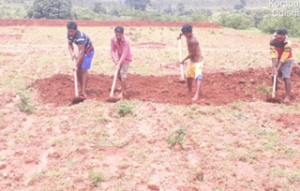Naranga denies Migration
Ramesh Ch. Swain
Migration to nearby city of Vishakhapatanam in search of livelihoods had been a regular phenomenon for the inhabitants of Naranga, a small village of 40 families with 650 population. Due to less cultivable land, they were struggling to meet their daily requirements. Naranga is a tribal village located in Panchada GP under Dasamantpur block of Koraput.
With the intervention of CYSD, few developmental works were initiated in the village. The community people had no rights over forest land. After submitting land right applications and with rigorous follow ups, the villagers were entitled for forest land under Forest Rights Act for the purpose of living, cultivation and collecting forest produces.
Taking into account the resources available in Naranga, a comprehensive participatory village planning was prepared and approved in Gram Sabha. Then in convergence with line Departments the land was developed for enhancement of livelihoods of the poor families. Under OTELP programme, input support for vegetable cultivation and mango plantation in WADI programme were provided to them. The broad interventions in the areas included land usage planning, soil and water harvesting measures and improved farm based agro-forestry practices. The capacities enhancement of community cadres, collaboration with block and district administrations have resulted in mobilizing all families to join the MGNREGS works for earnings. Involvement in MGNREGS helped them mostly to get 100 days of employment in last year. Successful implementation of MGNREGS in the village resulted in checking the villagers’ migration, provided them employment at critical period and ensured alternative livelihood options like, trading, tailoring, cattle rearing, handicrafts, collection and selling of forest produces and running grocery shops. 13 SHGs have also been formed and strengthened for their collective development.
Now, the villagers have got requisite skill to manage their earnings from vegetables cultivation. WADI intervention has also impacted the economic upliftment of the villagers through sustainable agriculture, social empowerment, improvement in quality of life including health, women empowerment, increase in food and nutritional security.
With available sources and noticeable livelihoods enhancement, the villagers have changed their mindset not migrate further. Following which migration rate has declined drastically as the tribal people can adjust to a particular way of life in their own village.
The interventions have reduced the vulnerability and Naranga has become a self-sustained village. Now, the residents are looking forward to community development with bigger plan to address their secondary needs.
